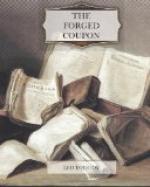Here is a bachelor grown old, the owner of thousands of acres, who has lived a life of idleness, greed, and over-indulgence, who reads The New Times, and is astonished that the government can be so unwise as to permit Jews to enter the university. There is his guest, formerly the governor of a province, now a senator with a big salary, who reads with satisfaction that a congress of lawyers has passed a resolution in favor of capital punishment. Their political enemy, N. P., reads a liberal paper, and cannot understand the blindness of the government in allowing the union of Russian men to exist.
Here is a kind, gentle mother of a little girl reading a story to her about Fox, a dog that lamed some rabbits. And here is this little girl. During her walks she sees other children, barefooted, hungry, hunting for green apples that have fallen from the trees; and, so accustomed is she to the sight, that these children do not seem to her to be children such as she is, but only part of the usual surroundings—the familiar landscape.
Why is this?
THE YOUNG TSAR
The young Tsar had just ascended the throne. For five weeks he had worked without ceasing, in the way that Tsars are accustomed to work. He had been attending to reports, signing papers, receiving ambassadors and high officials who came to be presented to him, and reviewing troops. He was tired, and as a traveller exhausted by heat and thirst longs for a draught of water and for rest, so he longed for a respite of just one day at least from receptions, from speeches, from parades—a few free hours to spend like an ordinary human being with his young, clever, and beautiful wife, to whom he had been married only a month before.
It was Christmas Eve. The young Tsar had arranged to have a complete rest that evening. The night before he had worked till very late at documents which his ministers of state had left for him to examine. In the morning he was present at the Te Deum, and then at a military service. In the afternoon he received official visitors; and later he had been obliged to listen to the reports of three ministers of state, and had given his assent to many important matters. In his conference with the Minister of Finance he had agreed to an increase of duties on imported goods, which should in the future add many millions to the State revenues. Then he sanctioned the sale of brandy by the Crown in various parts of the country, and signed a decree permitting the sale of alcohol in villages having markets. This was also calculated to increase the principal revenue to the State, which was derived from the sale of spirits. He had also approved of the issuing of a new gold loan required for a financial negotiation. The Minister of justice having reported on the complicated case of the succession of the Baron Snyders, the young Tsar confirmed the decision by his signature; and also approved the new




